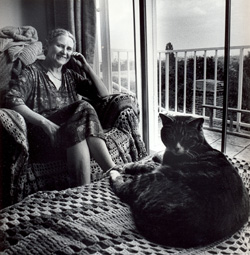
Novelist, Story Writer, Autobiographer, Poet, Playwright.
Active 1948- in England, Britain, Europe; Zimbabwe, Southern Rhodesia, Africa
 |
Doris Lessing, 1984. © Marianne Majerus |
Doris Lessing is a visionary writer. Now in her eighties, her output is still prolific. Her huge body of published work, for which she is internationally acclaimed, includes novels, stories, non-fiction, poems, plays and opera libretti. She has recently received, among other honours, the David Cohen British Literature Prize, the Companion of Honour from the Royal Society of Literature and the Golden PEN Award for a Lifetime's Distinguished Service to Literature. Her depth and range of vision encompasses concerns about environmental disaster, the threat and consequences of warfare, the collision of race and culture, the collapse of political and social systems and the dynamics of the family. Archetypal narratives of quest and invasion (often in the form of colonisation) recur throughout her writing. The earliest stories were published in Southern Rhodesia (now Zimbabwe) in 1948, while her twenty-fourth novel, The Sweetest Dream, which explores the transience of political ideologies, was published in 2001. A new collection of four novellas, entitled The Grandmothers, was published in 2003. In lighter vein, Lessing has written several books about cats, her favourite animal, and published her most recent poems on playing cards (INPOPA Anthology, 2002). Not only do her books span more than half a century, they also display a great formal variety, including generically hybrid texts, dystopian, fabular, inner space and space fiction, and closely observed social realism.
How does one begin to understand the complexities of Lessing as a writer and the ways in which the experiences of her life have shaped her work? A passage of introspection from the first volume of her autobiography perhaps provides one useful key to understanding Lessing's writing. She describes her own mind-set as “that emotional or psychological double helix coiled at the roots of my nature” (Under My Skin, p.357). A disposition which reserves the inner axis of self while exploring different political or social ideologies has often caused her to change direction rather unaccountably (p.398). Her self-analysis is suggestive of a multi-layered and restless imagination and may explain the ease with which she frequently writes books of different forms and genres simultaneously.
Lessing was born Doris May Tayler on 22nd October 1919 in Persia (now Iran) where she lived until she was five. Her mother, formerly Emily McVeagh, had been a sister at the old Royal Free Hospital in the East End of London, where she had nursed many wounded soldiers from World War One
